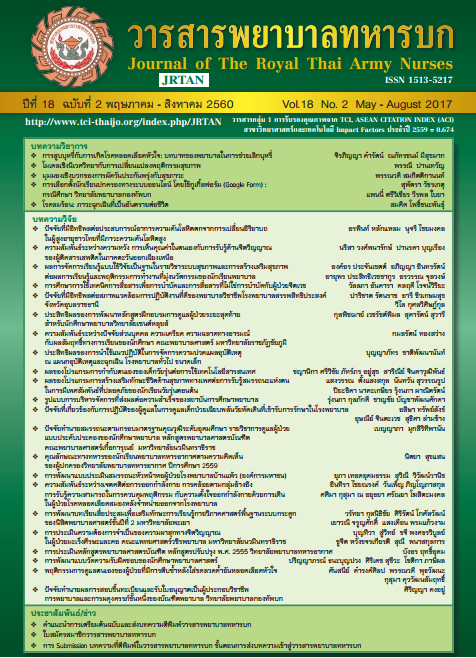ปัจจัยทำนายสมรรถนะตามกรอบมาตรฐานคุณวุฒิระดับอุดมศึกษา รายวิชาการดูแลผู้ป่วยแบบประคับประคองของนักศึกษาพยาบาล หลักสูตรพยาบาลศาสตรบัณฑิต คณะพยาบาลศาสตร์เกื้อการุณย์ มหาวิทยาลัยนวมินทราธิราช
Keywords:
การดูแลผู้ป่วยแบบประคับประคอง, พฤติกรรมการเรียนรู้, สภาพแวดล้อมทางการเรียน, สมรรถนะตามกรอบมาตรฐาน, คุณวุฒิระดับอุดมศึกษา, Palliative Care, learning behaviors, learningenvironment, Competencies based onThai Qualification Framework for Higher EducationAbstract
การศึกษาปัจจัยทำนายสมรรถนะตามกรอบมาตรฐานคุณวุฒิระดับอุดมศึกษารายวิชาการดูแลผู้ป่วยแบบประคับประคอง ของนักศึกษาพยาบาล คณะพยาบาลศาสตร์เกื้อการุณย์กลุ่มตัวอย่าง คือ นักศึกษาพยาบาลชั้นปีที่ 3 ปีการศึกษา 2557 จำนวน 191 คน เครื่องมือที่ใช้ในการวิจัย ประกอบด้วย คะแนนผลสัมฤทธิ์ทางการเรียนรายวิชาการดูแลผู้ป่วย แบบประคับประคอง แบบสอบถามพฤติกรรมการเรียนรู้แบบสอบถามสภาพแวดล้อมทางการเรียน และแบบประเมินสมรรถนะ ตามกรอบมาตรฐาน คุณวุฒิระดับอุดมศึกษารายวิชาการดูแลผู้ป่วยแบบประคับประคอง ซึ่งมีค่าความเชื่อมั่นเท่ากับ 0.76, 0.94 และ 0.89 ตามลำดับ วิเคราะห์ข้อมูลโดยหาค่าเฉลี่ย ส่วนเบี่ยงเบนมาตรฐาน ค่าสัมประสิทธิ์สหสัมพันธ์ของเพียร์สันวิเคราะห์การถดถอยพหุคูณ ผลการวิจัย พบว่า นักศึกษาพยาบาลมีคะแนนเฉลี่ยภาพรวมรายวิชาการดูแลผู้ป่วยแบบประคับประคองอยู่ในระดับน้อย (Mean = 64.54, SD = 4.35) มีพฤติกรรมการเรียนรู้อยู่ในระดับปานกลาง (Mean = 2.81, SD = .33) ประเมินสภาพแวดล้อม ทางการเรียนอยู่ในระดับดี(Mean = 4.13, SD = .34) มีสมรรถนะตามกรอบมาตรฐานคุณวุฒิระดับอุดมศึกษารายวิชาการดูแล ผู้ป่วยแบบประคับประคองอยู่ในระดับดี(Mean = 4.18, SD = .37) พฤติกรรมการเรียนรู้และสภาพแวดล้อมทางการเรียน มีความสัมพันธ์ทางบวกกับสมรรถนะตามกรอบมาตรฐานคุณวุฒิระดับอุดมศึกษารายวิชาการดูแลผู้ป่วยแบบประคับประคอง อย่างมีนัยสำคัญทางสถิติที่ระดับ .05 โดยมีค่าความสัมพันธ์เท่ากับ .442 และ .398 ตามลำดับ คะแนนรายวิชาการดูแลผู้ป่วย แบบประคับประคองไม ่มีความสัมพันธ์กับสมรรถนะตามกรอบมาตรฐานคุณวุฒิระดับอุดมศึกษารายวิชาการดูแลผู้ป ่วย แบบประคับประคองพฤติกรรมการเรียนรู้และสภาพแวดล้อมทางการเรียนสามารถทำนายสมรรถนะตามกรอบมาตรฐานคุณวุฒิ ระดับอุดมศึกษารายวิชาการดูแลผู้ป่วยแบบประคับประคองได้ร้อยละ 26.3
Factors Predicting Nursing Student’s Competencies based on Thai Qualification Framework for Higher Education of Nursing Students in Palliative Care Course, Kuakarun Faculty of Nursing, Navamindhadhiraj University
This research aimed to study the predicting factors of nursing student’s competencies based on Thai Qualification Framework for Higher Education in Palliative Care course. The sample was 191 the third year nursing students in academic year 2014. The data collection tools consisted of the achievement scores of Palliative Care Course, the learning behavior questionnaire, the learning environment questionnaire, and the competencies assessment based on Thai Qualification Framework for Higher Education in Palliative Care Course with the reliabilities of those tools including 0.76, 0.94 and 0.89 respectively. Data were analyzed by using mean, standard deviation, Pearson’s coefficient of correlation and stepwise multiple regression. The results showed that the nursing students had the achievement scores of Palliative Care Course at alow level of mean scores (Mean = 64.54, SD = 4.35) and moderate level of learning behaviors (Mean = 2.81, SD = .33). They had the high level of learning environment and competencies based on Thai Qualification Framework for Higher Education in Palliative Care (Mean = 4.13, SD = .34; Mean = 4.18,SD = .37). The achievementscores of Palliative Care Course were not associated with competencies based on Thai Qualification Framework for Higher Education in Palliative Care. Learning behaviors and learning environment were positive significantly associated with competencies based on Thai Qualification Framework Higher Education in Palliative Care. The stepwise multiple regression analysis showed that learning behaviors and learning environment can predict competencies based on Thai Qualification Framework for Higher Education in Palliative Care at percentage 26.3
Downloads
Downloads
How to Cite
Issue
Section
License
บทความหรือข้อคิดเห็นใดใดที่ปรากฏในวารสารพยาบาลทหารบกเป็นวรรณกรรมของผู้เขียน ซึ่งบรรณาธิการหรือสมาคมพยาบาลทหารบก ไม่จำเป็นต้องเห็นด้วย
บทความที่ได้รับการตีพิมพ์เป็นลิขสิทธิ์ของวารสารพยาบาลทหารบก
The ideas and opinions expressed in the Journal of The Royal Thai Army Nurses are those of the authors and not necessarily those
of the editor or Royal Thai Army Nurses Association.






